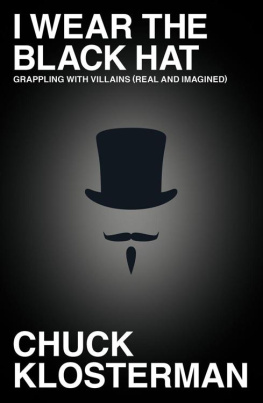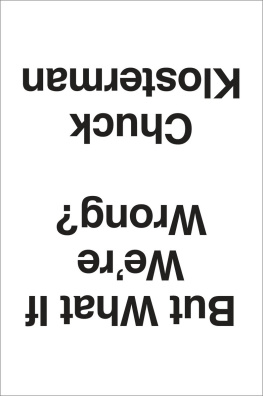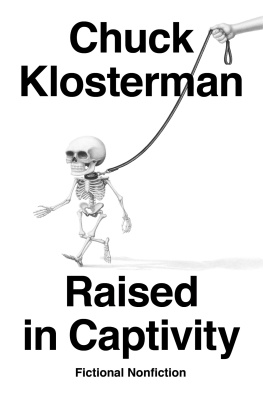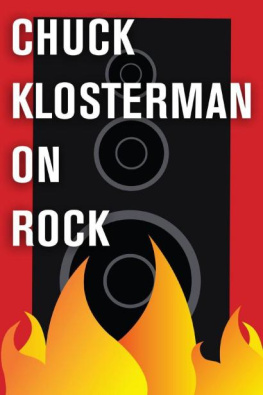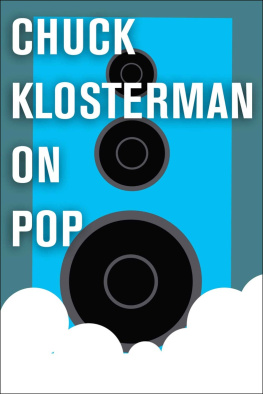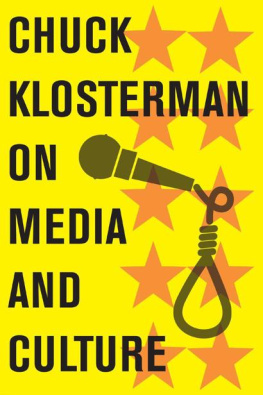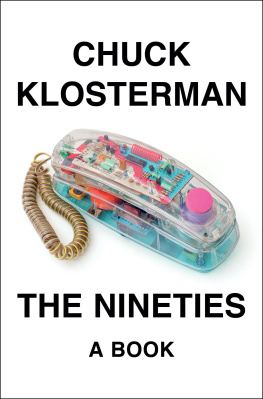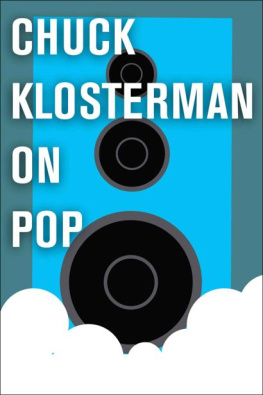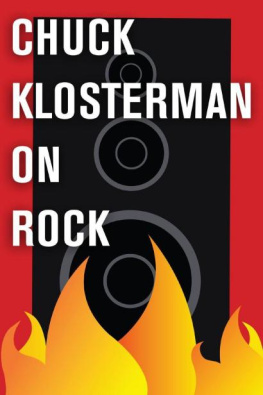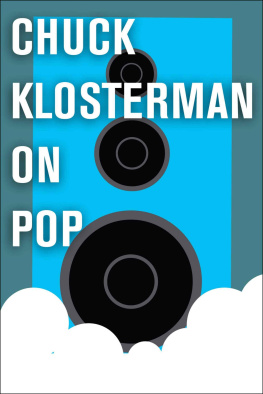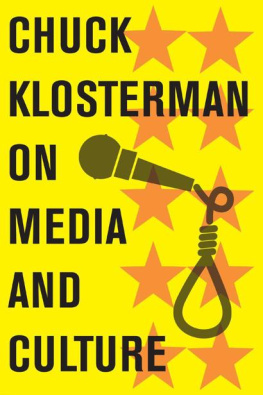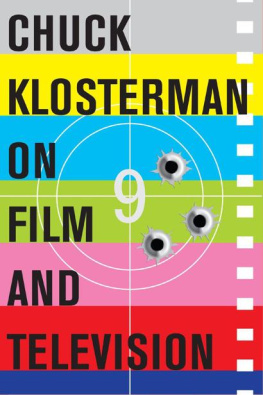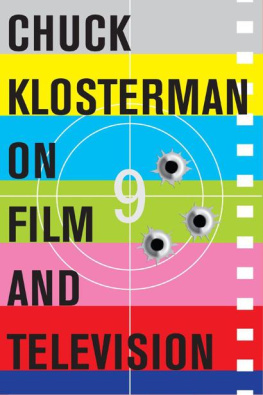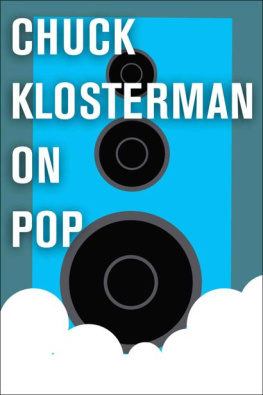Thank you for downloading this Scribner eBook.
Join our mailing list and get updates on new releases, deals, bonus content and other great books from Scribner and Simon & Schuster.
C LICK H ERE T O S IGN U P
or visit us online to sign up at
eBookNews.SimonandSchuster.com
CONTENTS
One should judge a man mainly from his depravities. Virtues can be faked. Depravities are real.
Klaus Kinski, super nihilist.
Im gonna quote a line from Yeats, I think it is: The best lack all conviction, while the best are filled... oh, no. Its the other way around. The best lack all conviction, and the worst are filled with a passionate intensity. Now, you figure out where I am.
Lou Reed, super high.
Im not a good guy. I mean, I dont hurt anybody. But I dont help, either.
Louis C.K., super real.
PREFACE
It seems like twenty-five lifetimes ago, but it was only twenty-five years: An older friend gave me a cassette hed duplicated from a different cassette (it was the era of tape dubbing, which was like file sharing for iguanodons). It was a copy of an album Id wanted, but the album was only thirty-eight minutes long; that meant there were still seven open minutes at the end of the cassettes A-side. In order to fill the gap, my friend included an extra song by Metallica. It was a cover of a song by the British band Diamond Head, a group I was completely unfamiliar with. The opening lines of the song deeply disturbed me, mostly because I misinterpreted their meaning (although I suspect the guys in Metallica did, too). The lyrics described bottomless vitriol toward the songwriters mother and a desire to burn her alive. The chorus was malicious and straightforward: Am I evil? Yes I am. Am I evil? I am man.
I cant remember precisely what I thought when I first heard those words I was a teenager, so it was probably something creative and contradictory, and Im relatively positive I imagined a nonexistent comma after the fourth am. But I do remember how I felt. I was confused and I was interested. And if I could have explained my mental state at fourteen with the clarity of language I have as a forty-year-old, I assume my reaction would have been the same complicated question I ask myself today: Why would anyone want to be evil?

I am typing this sentence on an autumn afternoon. The leaves are all dead, but still tethered to the trees, waiting for a colder future. Outside my living room window and three floors below, people are on the street. I vaguely recognize some of them, but not most of them. I rarely remember the names or faces of nonfictional people. Still, I believe these strangers are nonthreatening. I suppose you never know for certain what unfamiliar humans are like, but Im confident. They are more like me than they are different: predominantly white, in the vicinity of middle age, and dressed in a manner that suggests a different social class than the one they truly occupy (most appear poorer than they actually are, but a few skew in the opposite direction). Everyone looks superficially friendly, but none are irrefutably trustworthy. And as I watch these people from my window, I find myself wondering something:
Do I care about any of them?
I certainly dont dislike them, because I have no reason to do so. If one of these strangers were suddenly in trouble and I had the ability to help, I absolutely would but I suspect my motive for doing so might not be related to them . I think it would be the result of all the social obligations Ive been ingrained to accept, or perhaps to protect my own self-identity, or maybe because Id feel like a coward if I didnt help a damaged person in public (or maybe because others might see me actively ignoring a person in need). I care about strangers when theyre abstractions, but I feel almost nothing when theyre literally in front of me. They seem like unnamed characters in a poorly written novel about myself, which was written poorly by me. The perspective is first person, but the hero doesnt do much. He doesnt do anything. He just looks out the window.
This realization makes me feel shame... yet not so ashamed that I suddenly (and authentically) care about random people on the street. I feel worse about myself, but I feel no differently about them. And this prompts me to consider several questions at once:
1) Am I a psychopath?
2) Is my definition of the word care different from the definition held by other people? Is it possible that I do care, but that I define caring as an all-encompassing, unrealistic aspiration (so much so that it makes it impossible for me to recognize my own empathy)?
3) Does my awareness of this emotional gap actually mean I care more than other people? Or is that comical self-deception?
4) What if these strangers are bad people? Would that eliminate my emotional responsibility? Nobody needs to feel bad about not caring about Adolf Hitler. Right? Right. Well, what if some of these anonymous strangers if given the means and opportunity might behave exactly like Hitler? Or worse than Hitler? What if one of these people would become the Super Hitler, if granted unlimited power? Do I have to care about them until they prove otherwise? Do I have to care about them as humans until they invade Poland? And in order to be truly good, do I still need to keep caring about them even after theyve done so?
5) Why do I always suspect everyone is lying about how they feel?
6) Why do I think I can understand the world by staring out the window?
7) Lets assume half the people on my street are categorically good and half are categorically bad. I cant tell who is who, but (somehow) I know that this is irrefutably the case. Lets also operate from the position that humans somehow have agency over those two classifications. Lets assume there is no Higher Power and no afterlife, and that all of these self-aware people regardless of their social history or familial upbringing are able to decide if they want to be good or bad. Lets assume its every humans unambiguous choice, based on all the information available. If this is true, then the import of the word good and the import of the word bad are nothing more than constructions. They are classifications we created subjectively; their meanings dont derive from any larger reality or any deeper truth. Theyre just the two definitions we have agreed upon, based on various books and myths and parables and philosophies and artworks and whatever feels like the innate difference between rightness and wrongness. In other words, there are good people and there are bad people, but those two designations are unreal. The designations exist in conversation, but theyre utterly made-up. Within this scenario, would goodness still be something to aspire to? Wouldnt this mean that good people are simply the ones who accept that what theyve been told is arbitrarily true? That theyve accepted a policy they didnt create for themselves?
8) American philosopher John Rawls (19212002) had a lot of mind-crushing ideas, but perhaps the most significant was his concept of the veil of ignorance. It best applies to the creation of social contracts. At risk of oversimplification, Rawlss scenario was basically this: Lets pretend you were instantly able to re-create American society in totality, and you could do it in whatever way you wanted. You could make (or eliminate) whatever laws you desired, and you could implement whatever financial and judicial structures you believed would work best. However, you must do this under a magical veil of ignorance. The moment after you create this system, youll no longer be yourself (and you dont have any idea what your new role in this society shall be). You might be a rough facsimile of your current self, or you might be someone entirely new. Your gender might be different, or your race. Its possible you will be extremely destitute and appallingly ugly. Youll have a different level of intelligence and a different work ethic. You might suddenly be disabled, or super athletic, or homosexual, or criminally insane. As such, you will (probably) want to create a society that is as fair and complete as possible, since you have no idea what station youll inherit within your own new, self-constructed boundaries. You need to think outside of your current self, because tomorrow youll be someone else entirely. But try that same process with goodness , and particularly with how we gauge what goodness is. Try to come up with a list of declarations or rules that outline a universal definition for what it means to be good, for all people, for the rest of time. And do this under another veil of ignorance. Do this with the knowledge that tomorrow you will be a totally different person who views the world in a manner alien to your current self. This new you may have no ability to control your darker impulses. You may be incapable of natural compassion. You might have the emotional baggage of someone who was habitually ridiculed as a teenager, or of a child who was sexually tortured, or of a sorority girl born so rich shes never had a real chance to comprehend any life except the one she fell into by chance. Would this possibility affect your forthcoming invention of goodness ? Would you define the concept more broadly and with greater elasticity? For some reason, its human nature to say no. Our inclination is to see goodness as something that exists within itself; we want to believe goodness and badness are fundamental traits that transcend status or personal experience. The sorority girl and the serial killer dont get special dispensation due to circumstance. We do not want to see goodness and badness as things we decide, because those are terms that we need to be decided by someone else.
Next page
